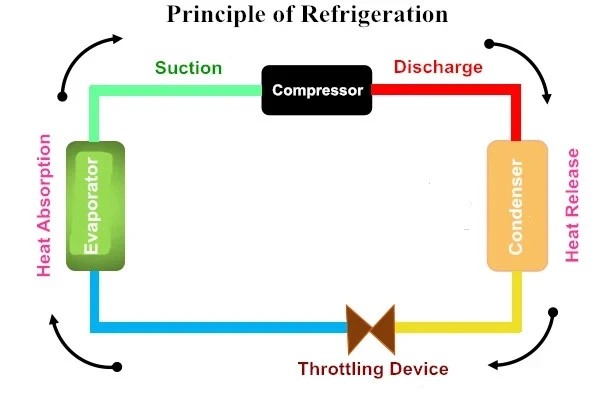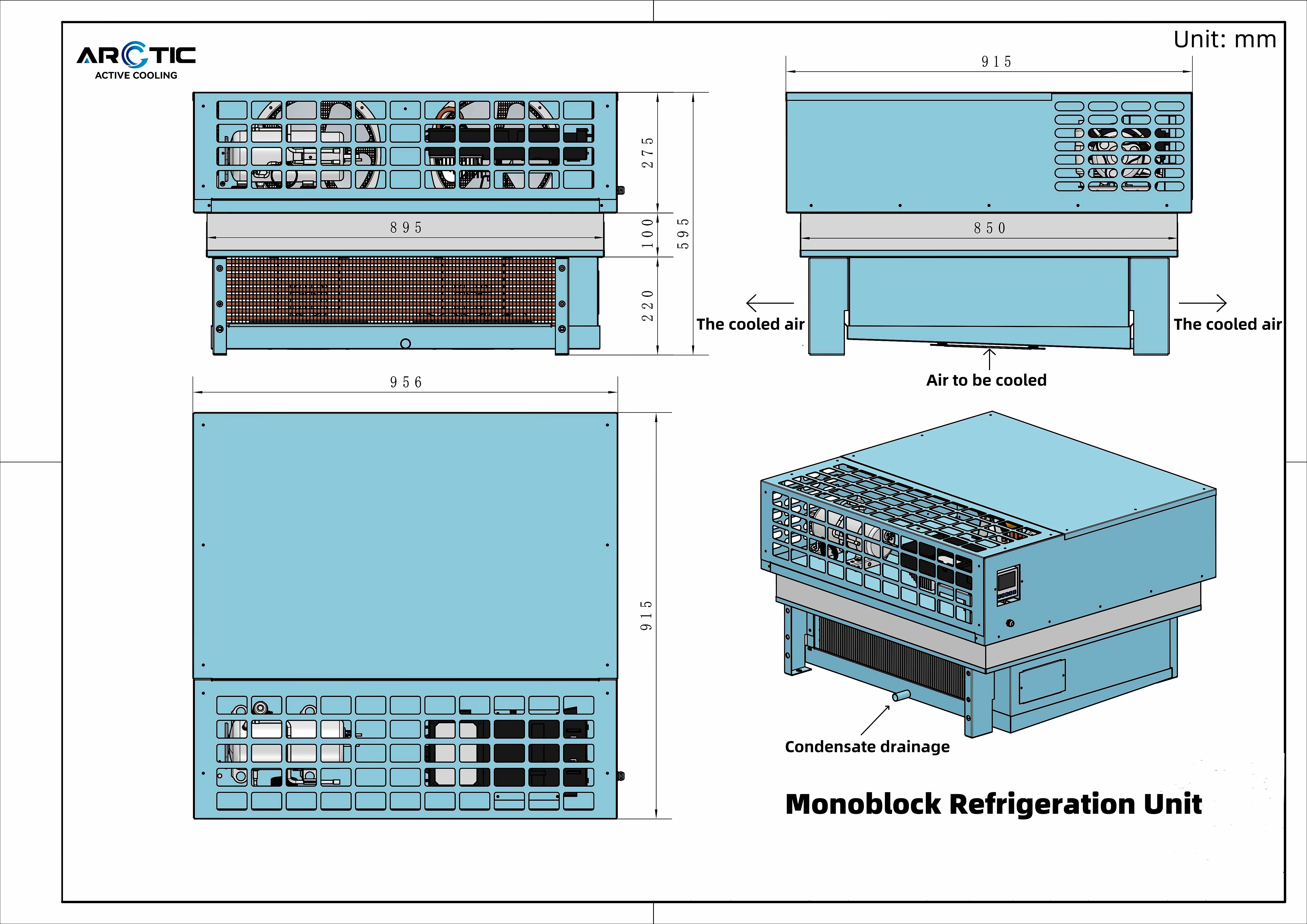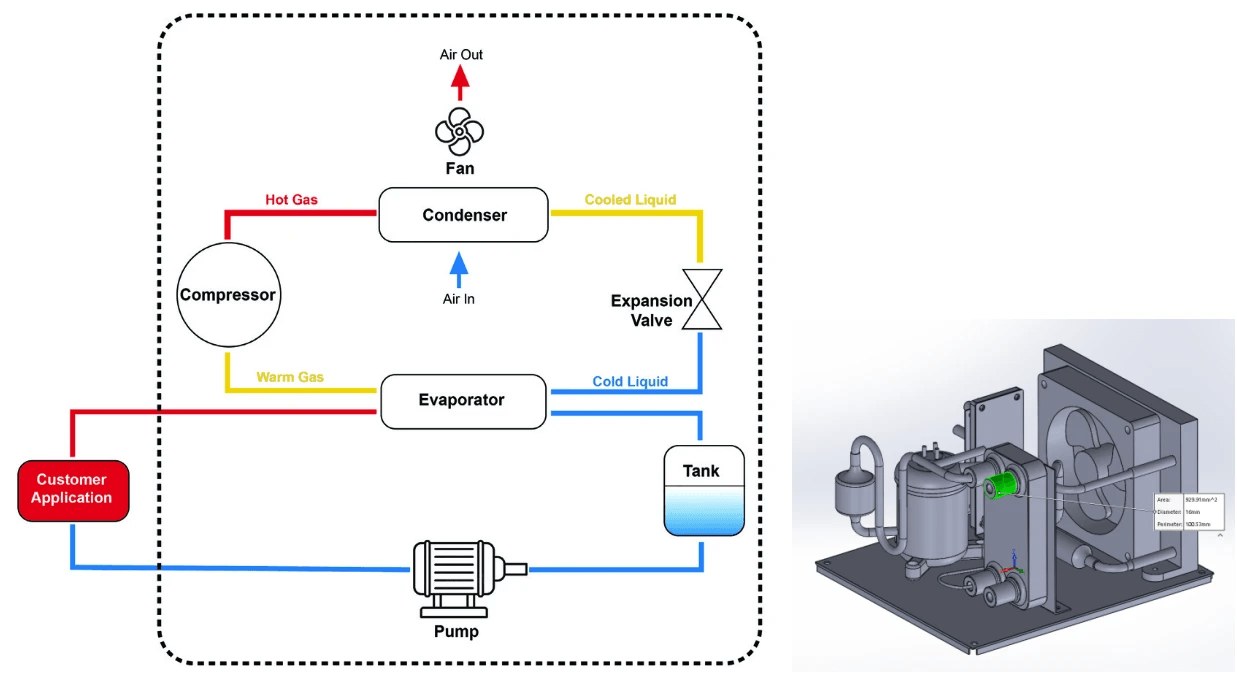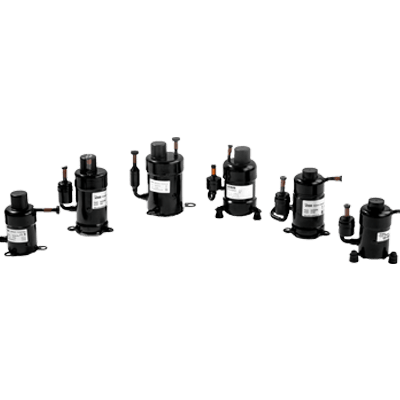Introduction

"Arctic Active Cooling. Endless Possibilities. We capture new technologies in mobile and compact cooling. Full-size cooling in a miniature design, customized to make your device stand out with innovative thermal management."
When it comes to refrigeration systems, the compressor is the unsung hero, quietly working behind the scenes to keep our food fresh and our drinks cool. But what does a compressor do? It's not just a simple mechanical part; it plays a critical role in HVAC systems and refrigeration processes alike, ensuring that everything runs smoothly. Understanding this function is essential for anyone curious about how these systems operate and why they’re so important in everyday life.
Understanding the Compressor's Role
The compressor's role can be summed up as the powerhouse of a refrigeration system. What does a compressor do in a refrigeration system? It pressurizes refrigerant, enabling it to absorb heat from inside your refrigerator or air conditioning unit and release it outside. Without this vital component, cooling wouldn't even be an option—it's like trying to run a race without your legs!
Importance of Refrigeration Systems
Refrigeration systems are essential not just for keeping food fresh but also for various industrial applications, medical storage, and even climate control in buildings. What does a compressor do HVAC-wise? In HVAC systems, compressors ensure that cool air circulates effectively throughout spaces, making them comfortable year-round. The efficiency of these systems heavily relies on proper functioning compressors; without them, we'd be left sweating through hot summer days or risking spoilage of perishable goods.
Overview of Arctic Active Cooling
One fascinating advancement in cooling technology is Arctic Active Cooling—a method that utilizes innovative cooling techniques for enhanced efficiency and effectiveness. What is the function of compression in such advanced systems? It helps maintain low temperatures while optimizing energy use—a win-win for both performance and sustainability! As we delve deeper into how compressors operate within these frameworks, we’ll uncover their pivotal role in transforming refrigerants and regulating temperatures across various applications.
What Does a Compressor Do in Refrigeration?

When it comes to refrigeration systems, understanding what a compressor does is crucial. The compressor acts as the heart of the system, tirelessly pumping refrigerant and ensuring that everything runs smoothly. Without it, the entire cooling process would come to a screeching halt, leaving you with warm drinks and spoiled leftovers.
Simplifying Refrigeration Mechanics
At its core, what does a compressor do? It simplifies the intricate mechanics of refrigeration by taking low-pressure refrigerant gas and compressing it into a high-pressure state. This transformation is essential for maintaining efficient operation within the refrigeration system and ensures that heat can be effectively absorbed and expelled during the cooling cycle.
Moreover, this simplification extends to HVAC systems as well; what does a compressor do HVAC-wise? It plays an equally vital role in air conditioning units by regulating temperature and humidity levels throughout your space. By streamlining these processes, compressors make it easier for users to enjoy comfortable indoor environments without constantly worrying about system performance.
Pressurizing Refrigerant for Efficiency
One of the primary functions of compression in a refrigeration system is to pressurize the refrigerant for efficiency. When we ask what is the function of the compressor?, we find that this pressurization allows for better heat exchange capabilities within both refrigeration and air conditioning systems. The higher pressure increases the boiling point of the refrigerant, enabling it to absorb more heat from its surroundings when it evaporates.
Additionally, this process enhances overall energy efficiency because a well-pressurized refrigerant requires less energy to circulate through coils and other components. In essence, understanding what does a compressor do in terms of pressurizing refrigerants can help users appreciate how crucial this component is for both cost savings and environmental impact.
Role in Heat Exchange Process
The role of compression in refrigeration systems goes beyond mere pressurization; it also facilitates effective heat exchange processes. So, what does the compressor do to the refrigerant? It drives heat absorption when low-pressure gas enters from evaporator coils while simultaneously expelling heat when high-pressure gas exits toward condenser coils.
This cyclical process ensures that your refrigerator or air conditioner maintains optimal temperatures consistently—after all, who wants warm milk or sweaty summer days? Understanding how compressors assist in temperature regulation gives insight into why they are indispensable components not only in refrigerators but also across various cooling applications worldwide.
The Function of Compression in Refrigeration Systems
In refrigeration systems, compression plays a pivotal role that can’t be overstated. Understanding what does a compressor do is crucial for grasping how these systems maintain cool temperatures effectively. By transforming refrigerants from low-pressure gas to high-pressure vapor, the compressor ensures that the entire system operates efficiently and reliably.
Converting Low Pressure to High Pressure
One of the primary functions of the compressor in a refrigeration system is converting low pressure to high pressure. This transformation is essential because it allows the refrigerant to absorb heat from its surroundings before it gets compressed. What does a compressor do during this process? It increases the temperature and pressure of the refrigerant gas, enabling it to flow through the coils where heat exchange occurs.
The ability to convert low pressure to high pressure not only enhances efficiency but also improves overall system performance. Without this conversion, what is the function of compression in refrigeration systems would be rendered ineffective, leading to insufficient cooling capabilities. Thus, understanding this fundamental process helps clarify why compressors are vital components in both HVAC and refrigeration applications.
Enhancing Refrigerant Flow
Another critical aspect of what does a compressor do in HVAC systems is enhancing refrigerant flow throughout the system. By pressurizing the refrigerant, compressors create a driving force that propels it through various components like evaporators and condensers. This enhanced flow ensures that heat can be efficiently absorbed and released as needed—key elements for maintaining desired temperatures.
Moreover, when discussing what does a compressor do in a refrigeration system, it's important to note that proper refrigerant flow directly impacts energy efficiency and cooling performance. If there were no effective mechanism for enhancing this flow, many systems would struggle with inadequate cooling or excessive energy consumption. Consequently, understanding how compressors facilitate refrigerant movement adds depth to our comprehension of their essential functions.
Impact on Cooling Cycles
The impact of compression on cooling cycles cannot be overlooked when considering what is the function of the compressor? The cycling process involves several stages where temperature changes are critical for effective cooling—compression being one of them. Each cycle begins with low-pressure gas entering the compressor; once compressed into high-pressure vapor, it undergoes further transformations within other components like condensers before returning as low-pressure gas again.
This cyclical nature highlights how integral compressors are within these processes; without them, can a refrigerator work without a compressor? The answer is typically no—most traditional refrigeration technologies rely heavily on compressors for efficient operation and optimal temperature regulation. Therefore, comprehending how compression influences these cycles sheds light on why maintaining proper functionality through regular maintenance is so important for both residential and commercial applications.
What is the Function of the Compressor?

The compressor plays a pivotal role in refrigeration systems, acting as the heart of the cooling process. Understanding what does a compressor do is essential for grasping how these systems maintain comfortable temperatures in our homes and businesses. It’s not just a mechanical part; it’s the driving force behind effective heat exchange and temperature regulation.
Key Component in Cooling Process
At its core, what does a compressor do in a refrigeration system? It compresses refrigerant gas, raising its pressure and temperature, which is crucial for efficient cooling. Without this key component, the entire refrigeration cycle would falter, leaving us with warm spaces instead of cool retreats.
In HVAC applications, understanding what does a compressor do HVAC-wise reveals its importance in maintaining indoor climates. The compressor enables the refrigerant to absorb heat from indoor air and release it outside, ensuring that your living space stays comfortable year-round. This vital function underpins not only comfort but also energy efficiency—an essential consideration in modern design.
Maintaining System Pressure Balance
One of the primary responsibilities of the compressor is maintaining system pressure balance within refrigeration systems. By compressing refrigerant gas into high-pressure vapor, it allows for effective circulation through evaporators and condensers. This pressure differential is crucial; without it, we wouldn't have that satisfying chill when opening the fridge door.
What is the function of compression in refrigeration systems? It's all about ensuring that there’s enough pressure to facilitate proper flow throughout various components. This balance prevents issues like freezing or overheating—problems that can arise when there’s insufficient pressure regulation.
Assisting in Temperature Regulation
Temperature regulation relies heavily on what does a compressor do to the refrigerant during its journey through an AC system or refrigerator. As it compresses refrigerant gas into high-pressure vapor, it prepares it for heat absorption from indoor spaces or food items stored within your fridge. This transformation allows for consistent temperature control—a non-negotiable requirement for both comfort and food safety.
Moreover, can a refrigerator work without a compressor? The answer is no! Without this vital component assisting in temperature regulation, achieving optimal cooling would be nearly impossible; other technologies simply cannot replicate its efficiency and effectiveness within traditional systems.
Can a Refrigerator Work Without a Compressor?

The thought of a refrigerator functioning without a compressor might seem as far-fetched as imagining a fish riding a bicycle. However, exploring this idea reveals intriguing alternatives and challenges within refrigeration technology. While the compressor plays a pivotal role in maintaining the cooling cycle, understanding its absence leads us to consider other mechanisms that can achieve similar results.
Exploring Alternatives to Compressors
In the quest for energy efficiency and eco-friendly solutions, several alternatives to traditional compressors are emerging in refrigeration systems. One such option is thermoelectric cooling, which utilizes the Peltier effect to create temperature differences without mechanical parts. Another alternative is absorption refrigeration, which employs heat sources—like gas or solar energy—to drive the cooling process, showcasing innovative ways to sidestep conventional compression methods.
Despite these alternatives, it's crucial to grasp what does a compressor do in HVAC applications: it pressurizes refrigerant and facilitates heat exchange. Compression remains integral for many existing systems due to its ability to efficiently convert low-pressure refrigerant into high-pressure gas. Exploring these alternatives highlights not only innovation but also the limitations faced when trying to replicate what is fundamentally accomplished by compressors.
Understanding Consequences of Absence
Without a compressor, the entire refrigeration process faces significant hurdles that could lead to inefficiency or even failure of cooling systems. The absence of this key component disrupts the balance necessary for heat absorption and release; thus, refrigerators would struggle significantly with temperature regulation and maintaining freshness in stored foods. Furthermore, without compression, achieving adequate pressure differentials becomes nearly impossible—essentially rendering traditional refrigeration ineffective.
Understanding what is the function of compression in refrigeration systems helps clarify why compressors are indispensable; they not only enhance refrigerant flow but also maintain system pressure balance crucial for optimal operation. The consequences of removing this component extend beyond mere inconvenience; they can lead to increased energy consumption and higher operational costs as alternative methods often lack efficiency compared to compression-based systems.
Limitations of Non-Compressors Technology
While non-compressor technologies offer fascinating possibilities for reducing carbon footprints and enhancing sustainability, they come with their own set of limitations that can’t be overlooked. For instance, thermoelectric coolers generally provide lower cooling capacities compared to traditional compressors; thus, they may not be suitable for larger applications like commercial refrigerators or freezers where robust performance is essential. Additionally, absorption systems require substantial energy inputs for heating—making them less efficient than one might hope when considering overall energy use.
Moreover, understanding what does the compressor do in an AC system reveals just how integral it is in driving overall performance; without it, you lose critical functionalities like effective heat transfer and consistent temperature maintenance across various environments. Ultimately, while exploring alternatives sheds light on potential advancements in technology and environmental friendliness, it's clear that current non-compressor solutions have significant limitations that prevent them from fully replacing traditional compressors anytime soon.
What Does the Compressor Do to the Refrigerant?

Transforming Refrigerant State
At its core, the function of the compressor is to transform the state of the refrigerant from low-pressure gas to high-pressure gas. This transformation is crucial because it allows for efficient heat transfer within the system; without this process, cooling wouldn't happen effectively. In essence, when you ask what does a compressor do? remember that it’s all about changing states – from vapor to liquid and back again – while maintaining optimal pressure levels.
Driving Heat Absorption and Release
One of the most critical aspects of what does a compressor do in an AC system is its role in driving heat absorption and release. By compressing the refrigerant, it increases its temperature and pressure, enabling it to absorb heat from inside your refrigerator or air conditioning unit more effectively. This process ensures that as warm air is drawn into your cooling unit, cool air can be released back into your living space, making comfort possible.
Impact on Overall System Performance
The impact of compression on overall system performance cannot be overstated; it's truly what makes or breaks an HVAC system’s efficiency. A well-functioning compressor ensures that refrigerants circulate properly throughout the entire refrigeration system, optimizing energy use while maximizing cooling output. If you've ever wondered if a refrigerator can work without a compressor, you'll quickly realize that without this key component performing its functions efficiently—like converting low-pressure gas into high-pressure gas—the entire cooling cycle would falter.
Conclusion

In summary, understanding what a compressor does is crucial for grasping the overall functionality of refrigeration systems. The compressor plays a vital role in converting low-pressure refrigerant into high-pressure vapor, facilitating heat exchange and ensuring efficient cooling. Without this essential component, the entire system would struggle to maintain desired temperatures, underscoring its importance in both refrigeration and HVAC applications.
Key Takeaways on Compressor Functionality
What does a compressor do in a refrigeration system? Simply put, it’s responsible for pressurizing the refrigerant, which allows for effective heat absorption and release during the cooling cycle. This transformation is fundamental not just in refrigerators but also in HVAC systems where temperature regulation relies heavily on how well the compressor performs.
Importance of Proper Compressor Maintenance
Proper maintenance of compressors is crucial to ensure they operate efficiently over time. Neglecting what does a compressor do can lead to decreased performance and increased energy consumption, ultimately affecting your cooling needs and wallet. Regular checks can prevent serious issues that might arise from wear and tear or improper functioning, emphasizing that understanding what is the function of compression in a refrigeration system goes hand-in-hand with proactive upkeep.
Future Trends in Refrigeration Technology
As technology evolves, so do compressors—leading to innovations that enhance their efficiency and sustainability. Future trends may include eco-friendly refrigerants and smarter control systems that optimize what does a compressor do in real-time based on environmental conditions. These advancements promise better energy efficiency while addressing climate concerns, showcasing how essential compressors will remain at the forefront of modern refrigeration technology.
